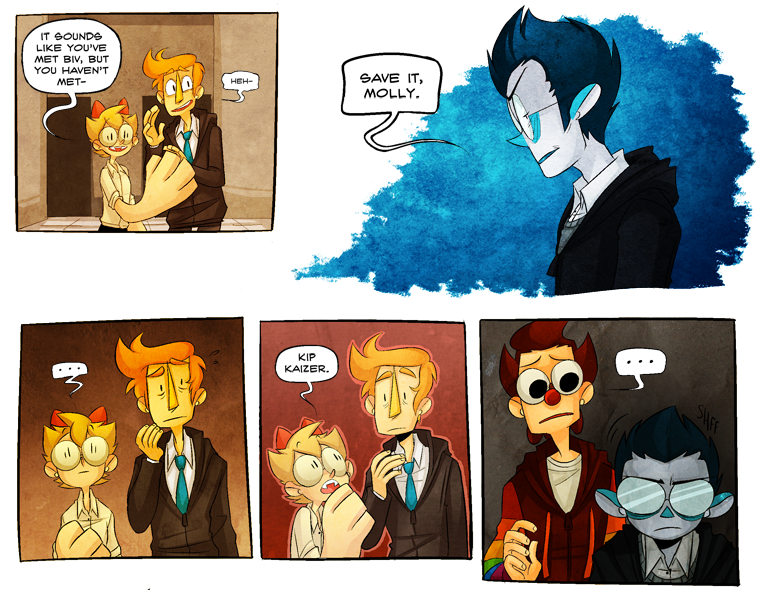The best-known comic book allegory about prejudice is X-Men, who are feared and despised by a society that doesn't understand them. The allegory doesn't stand up to much scrutiny, however, as attempting to differentiate between mutants who were born with powers and the beloved Marvel Universe heroes who gained theirs through accident or scientific experimentation is senseless.
And then there's bigotry and how it relates to economic disparity. It rarely comes up. The X-Men are generally upper-middle class; at least one of them was worshiped as a goddess. I don't think mutants, as a whole, are portrayed as poor, and are in a desperate situation where they contribute to the crime rate or are relegated to the slums. (Morlocks, maybe.)
Taylor C.'s Monsterkind tackles the latter. There's a gap between rich and poor, and in falls along racial lines -- in this case, the humans and the monsters. The humans live in District A, which everyone assumes is for the wealthy and well-off. The monsters typically live in District C, full of rundown tenement buildings and rampant poverty. There is fear and resentment.
So who are monsters? In Monsterkind, they seem humanoid but with a deformity that sets them apart. This is a cute comic, though, so the deformities aren't shown as being off-putting. Rather it's ... adorable? Some monsters have red clown noses. Other times, they have big hands. A better title for this webcomic perhaps would have been Muppetkind.
The story centers on two characters Wally (a human) and Kip (a monster). Both are rather progressive, and they would love to see a world where there's no hatred between the two races. Both, too, have to overcome their own fears. Wally is a social worker who, through the requirements of his job, has to move from District A to District C. In the first few pages, we see the world through his eyes: His neighbors seem to him like ghosts and demons. It doesn't get any better, as his job is to go door to door to meet with potential clients ... and that's when fear and distrust really hits home. Wally's best-case scenario is that the door is slammed in his face. Worst case: They threaten his life. The monsters see him as an unwelcome pest -- someone trying to force them to live a certain way.
Kip, too, must come to terms with humankind. When Wally moves in to his apartment building, he immediately gives him the cold shoulder. Kip is seen as a community leader, and when he treats Wally as a stranger, others follow his example. It's hinted that there's something in Kip's past to cause his distrust. Kip, however, would also like to see a world where there's no distrust, even when he himself is viewed by humans as an unwelcome presence. When boarding a subway, humans give him a wide berth, regarding him with hateful eyes.
The one thing that detracts a little, though, is the utter cuteness of Monsterkind. Seriously, it seems like every two pages there's somebody blushing. I suppose that the levity helps to distract from the direness of the situation. However, it seemed a little forced, and it chips away at the character development somewhat. Kip, for example, is given the characteristic that he's totally immobilized when hugged. Hence, this rather stern character often gets some comedy scenes where he's hugged, he blushes, his body becomes limp, and tons of cartoon hearts float to the sky.
Moments like that are a little too cutesy for me, though I suppose it does serve a purpose. Even when there is fear and distrust fomenting between the races, it doesn't mean that the world is totally devoid of joy and happiness.

